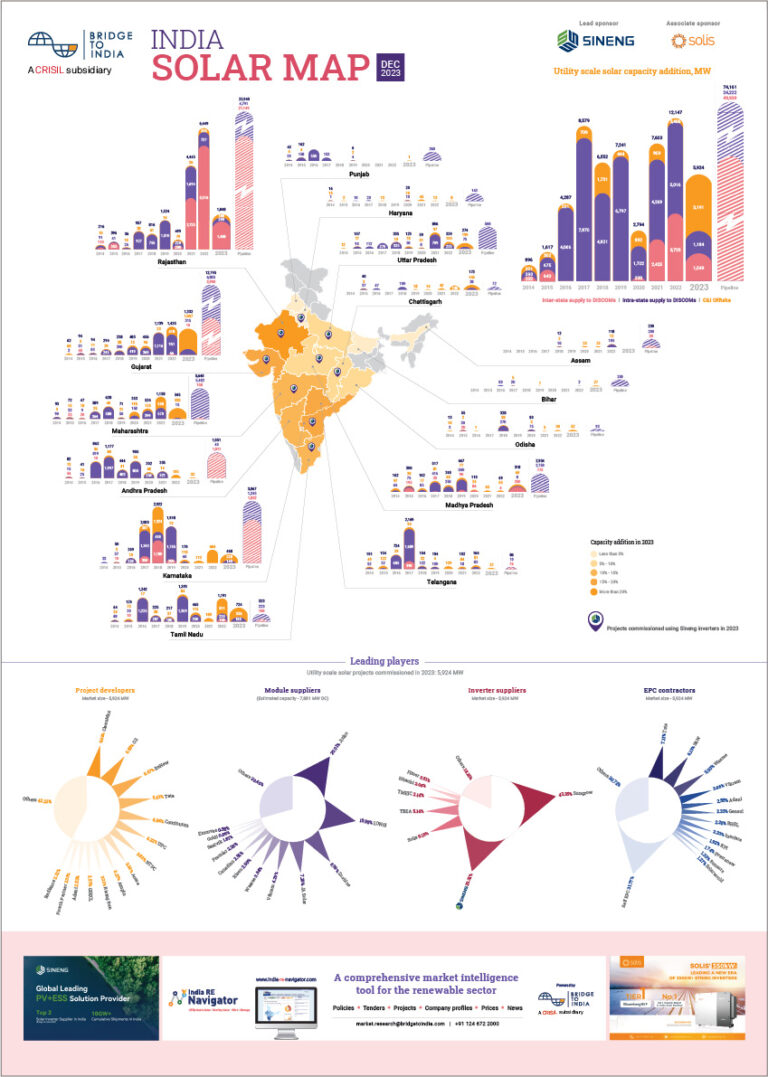Market Intelligence at BRIDGE TO INDIA constantly tracks the Indian solar market and provides insight on the latest market developments as they occur. This analysis is compiled into our INDIA SOLAR WEEKLY MARKET UPDATE which is sent to members of our mailing list. Subscribe to this list to receive the update every week.
The latest INDIA SOLAR WEEKLY MARKET UPDATE gives an overview of the following:
- Kiran Energy’s plans to set up power plants for industrial and commercial consumers
- Regulatory challenges that surround the captive commercial market segment
- Key questions that need to be answered in context with making the captive commercial market viable
Kiran Energy has announced its plans to set up several solar power projects that will use bilateral power purchase agreements (PPAs) with commercial and industrial consumers. Kiran Energy points out that there is a big demand for power from industrial houses in Chennai, so much so, they could put up a 100MW plant to cater to them. Apart from that, the company is also looking to put up projects in Kartnataka. It is expected that 100MW could come up in a solar park near Bijapur, Karnataka. Another 50MW is planned for rooftop projects in Karnataka. The entire capacity would be based on bilateral power purchase agreements (refer).
Commercial and industrial tariffs in many parts of India have already reached parity with the cost of solar power. With limited policy driven project development opportunities in 2012, many developers are looking at such private PPAs as a viable business opportunity.
Even though the business models for private PPAs make financial sense for both the power consumer and the investor, there are many regulatory challenges around the grid interconnectivity, open access, and the applicability of the Renewable Energy Certificates (REC) mechanism for plants adopting such business models.
Some of the open questions around these business models include:
- Why will an industrial or commercial consumer buy solar power and not cheaper thermal or wind power through third-party PPAs?
- If the project developer’s SPV takes Accelerated Depreciation (AD) for the plant, it leaves no scope for the power consumer to avail any benefit from AD. Why will then an energy consumer not set up their own plant?
- The DISCOMs take away the Universal Service Obligation for the customer, i.e., the DISCOMs in no longer obligated to supply regular power to a consumer. Solar power, that is difficult to precisely schedule, poses a risk for the consumer. How is this risk mitigated for the consumer?
- Open access requires power production and injection to be scheduled with a high degree of precision. How will you, as a power producer, manage power scheduling for solar?
- The DISCOM also reduces the contracted demand of the consumer, if the solar power is not available for a certain time period and power overdrawn from the grid, it will cause high financial losses for the client. Who takes on this risk, the consumer or the project developer?
BRIDGE TO INDIA is working to answer these questions and more. Please feel free to get in touch with us to discuss any solutions or to ask us any questions you may have on the Indian solar market.
Subscribe to our mailing list to recieve our INDIA SOLAR WEEKLY MARKET UPDATE.












